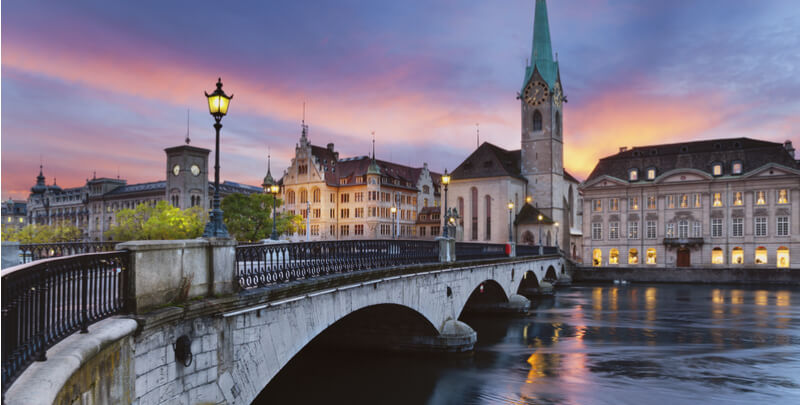Minimum wage in Switzerland? What you need to know
Switzerland has vibrant cities, a refreshing natural environment, and some of the highest standards of living on the planet. It’s no surprise that it’s a...

Switzerland has always been a popular destination for would-be expats. Whether you’ve been living in the country for a number of years with a spouse, you’re wondering if you’re eligible to apply for dual citizenship or you’re interested in taking up residence in Switzerland for an employment opportunity, below we’ve broken down the ins and outs of eligibility and the application process to become a Swiss citizen.
There are many advantages to being a Swiss citizen. Often regarded for its quality digital and healthcare infrastructure, education and home and financial asset ownership, the appeal of the European country as a home and business hub is lost on few. In fact, it’s ranked third out of 30 developed countries on the Inclusive Development Index 2017.
Interestingly, a 2012 report published by A Federal Commission on Migration found that while around 900,000 foreign people who were living in Switzerland were eligible for citizenship, only around 36,000 people – just 2% of expats in Switzerland – had applied for and successfully become Swiss citizens in the previous year.
That being said, with recent political changes in Europe that threaten some non-citizens residency status, the Swiss government has seen an influx of applications for citizenship.
A Swiss permanent residence permit (settlement permit C) allows a foreigner to live in Switzerland under the same conditions and with the same governmental benefits as Swiss nationals. These benefits are wide ranging, including open access to employment, the ability to easily set up and run a new company, the right to a free public education and the recognition of qualifications and grants.
Additionally, residents are able to buy real estate without any restrictions, are able to live anywhere in Switzerland and have access to welfare benefits and social assistance.
Swiss citizens, however, enjoy all of the above benefits plus the right to vote and to stand for public office. Also, Swiss residence permits will lapse if you leave the country, but Swiss citizenship will allow you to keep your passport, even if you take up residence abroad.
That being said, becoming a Swiss citizen also makes you subject to the same legal obligations as natural born Swiss citizens, such as undertaking military service if you’re a man between the ages of 18 and 24.
Many foreigners who live long-term in Switzerland appear happy to remain on a Swiss permanent residence permit rather than go through the lengthy Swiss naturalization process. If you’re hoping to solidify your ties with the country, hold a Swiss passport or mitigate the risk of being suddenly ineligible for residence, however, it’s a good idea to obtain your citizenship in the European country.
There are three ways to gain Swiss nationality – through birth, by being married to a Swiss citizen and by naturalization.
Unlike in some other countries, a baby born on Swiss soil does not automatically become a Swiss citizen. The child will only be considered Swiss if he or she is born to married parents, at least one of whom is Swiss or born to an unmarried Swiss father, and provided that the father acknowledges paternity before the child turns 22. Additionally, if the child is under the age of 22 and was not included in the naturalization of his or her parents but has lived in Switzerland for at least five years (including one year immediately before the application), they’ll be eligible for citizenship.
Children of a parent who lost their Swiss citizenship but can still show close ties to Switzerland might be eligible for renaturalization.
“Facilitated naturalization” is an opportunity to fast-track the citizenship application for those who have been married to a Swiss citizen for at least three years, and have lived in Switzerland for a total of five years at a minimum. However, this type of naturalization does not apply to non-married couples (including registered partners), and at the moment Switzerland does not permit or recognize same-sex marriage.
If you live with your spouse abroad, you may still be eligible to apply for naturalization if you can prove close links to Switzerland and have been married to a Swiss citizen for no fewer than six years.
All applicants for facilitated naturalization will have to fulfill certain requirements in order to be granted citizenship, including proving their ability to integrate into Swiss society through learning or proving that they can speak one of the three Swiss languages (German, French or Italian). Applicants will also need to prove that they have a history of complying with Swiss law, have no criminal record and are no danger to Swiss security.
Foreigners who have lived in Switzerland for a minimum of 12 years may apply to become a Swiss citizen through the regular naturalization process.
Note: years spent in Switzerland between the ages of 10 and 20 count for 2x their actual duration.
Additionally, for applicants who are seeking their citizenship as a married couple, the twelve year requirement applies to only one partner. The other partner is only required to have lived in Switzerland for five years.
As with any other application type, expats who are going through the regular naturalization process will be required to prove that they have fluency in at least one of Switzerland's national languages.
Americans & Canadians are eligible to apply for Swiss citizenship after only five years of residency, rather than the standard 12 years.
In February 2017, the Swiss passed legislation which makes it easier for the grandchildren of immigrants to gain nationality. The law was approved by 60.4% of voters and a majority of cantons. This will affect previous laws that didn't automatically grant Swiss nationality to children born on Swiss soil. It was the fifth time this issue was put the ballot box, the first time being in 1983.
A new parliamentary law was passed in June 2014, which modifies the Swiss citizenship application process. Among other things, it reduces the years of residence required from 12 to 10 years. This will go into effect by January 1, 2018.
Although the required residency was reduced in this recent legislation, the Swiss still have one of the longest naturalization periods within the EU.
There are also several other updates that will take effect. For instance, the years spent in Switzerland as a child – which count as two times their actual duration towards the citizenship application process - are now only applicable for children between 10 and 18, versus the previous 10 and 20. Additionally, years spent in Switzerland as a refugee or asylum seeker count for six months each towards citizenship. Cantonal residency requirements state that the candidate must reside in the specific canton in which they're applying for between two and five years.
Finally, only residents holding a Swiss permanent residence (permit C) will qualify for years of residency that contribute towards citizenship, once the new law comes into effect. Those that hold temporary permits will no longer be eligible to count those years living in Switzerland towards citizenship. All of these updates will be valid as of January 1, 2018.
Note: Swiss residents who don’t hold a Permit C but meet the current conditions of 12 years of residence are advised to apply for citizenship before all changes are implemented, as they’ll no longer qualify in the future.
The Swiss acknowledge dual nationality; therefore, if you chose to take on Swiss nationality, you can retrain both, assuming your country of origin also allows dual nationality.
When applying for Swiss citizenship, you must apply on three levels: confederation, canton and commune.
Swiss citizenship is only given to applicants who are able to satisfy the naturalization requirements for the canton and commune where they live.
The requirements vary considerably between cantons, as does the process. For example, you may be required to live in the canton for a certain amount of years, or one commune may ask you to take a written or verbal naturalization examination while another may make the decision by a communal assembly (see citizenship requirements per canton). It’s important to review the canton residence requirements in your region.
The final step in citizenship is approval at the federal level. The requirements here are the same for everyone: you need to be culturally and socially integrated into Swiss society and familiar with Swiss customs and traditions, comply with Swiss law and not be a threat to Swiss security.
The State Secretary for Migration examines whether applicants are integrated in the Swiss way of life, are familiar with Swiss customs and traditions, comply with the Swiss rule of law, and do not endanger Switzerland's internal or external security. The secretary makes their decision based on reports from the applicant’s canton and commune.
The State Secretary for Migration has the power to then “green light” an applicant’s request to begin the naturalization process, however, that approval does not necessarily mean citizenship is guaranteed.
You may be asked to prove multiple times that you pay your Swiss taxes, that you're prepared to perform military service, that you’ve not broken any laws, that you speak French, German or Italian, that you're attached to and professionally and socially integrated in Switzerland and that you're of good character and aren't being financially supported by the state.
If the FOM approves your application, you’ll be granted a federal naturalization permit.
The process of becoming a Swiss citizen is a lengthy one and typically lasts for several years. This is partly due to the fact that the process varies significantly between cantons, creating a bottleneck at the governmental level.
The cost of the application process can seriously add up thanks to the three necessary levels of authorization. Essentially this system means that fees are paid three times, once at each the federal, the canton and the commune level.
Additionally, the fees at each cantonal and commune levels can vary greatly from several hundred to several thousand francs. Plus, additional fees from obtaining criminal record certificates and debut registry certificates may be incurred.
If you’re funding your citizenship application process from your international bank account, use Wise to get the real exchange rate and cut out expensive international bank transfer fees.
The Swiss passport is considered one of Europe’s most difficult passports to obtain. However, it does provide many travelling benefits – the Swiss passport ranks fourth on thepassport power index, and offers visa-free access to 155 countries.
To apply for a Swiss passport, you need a permit C, as outlined above. You must also meet the following criteria: pay all of your taxes, be prepared to perform military service, have not broken any laws, speak a Swiss language, be of good character, be professionally and socially integrated in Switzerland and not be supported by the state.
The process of applying for a passport is typically combined with the process of applying for an identity card, both of which can be done over the Internet or over the phone. Once your application has been approved, you’ll need to visit your local passport office (or consulate) in order to have your biometric data (fingerprints) recorded, as well as getting your picture taken and signing your new documents. Depending on which canton you live in, you may be able to bring digital copies of your passport photo with you instead of having one taken onsite. Once the process is complete, both your passport and ID card will be mailed to you, and you’ll typically receive them within 10 working days.
If you’re not already familiar with money and banks in Switzerland, you’ll want to do a bit of research into how to open Swiss bank account to help cut down on the costs of living and citizenship application.
The Swiss government’s website also provides an easy overview of the naturalization process, as well insights into who may apply for the simplified naturalization procedure and who is eligible to apply by marriage or birth.
Good luck on becoming a Swiss citizen!
*Please see terms of use and product availability for your region or visit Wise fees and pricing for the most up to date pricing and fee information.
This publication is provided for general information purposes and does not constitute legal, tax or other professional advice from Wise Payments Limited or its subsidiaries and its affiliates, and it is not intended as a substitute for obtaining advice from a financial advisor or any other professional.
We make no representations, warranties or guarantees, whether expressed or implied, that the content in the publication is accurate, complete or up to date.

Switzerland has vibrant cities, a refreshing natural environment, and some of the highest standards of living on the planet. It’s no surprise that it’s a...

Whether you’re a Brit, Australian, or an American, you’re sure to be enchanted by Europe’s small Alpine jewel. Switzerland has much to offer expat retirees:...

Moving abroad is a huge undertaking, even though people do it for so many reasons: for work, to go to school, to follow love or just to find a new adventure....

Switzerland has far more to offer than just charming Alpine slopes and delicious chocolate. The universal healthcare system in Switzerland has a world-class...

Switzerland is a popular place for expats to live and work, who can be attracted by the high standard of living and favourable tax regime. The major cities...

Zurich is the largest city in Switzerland, and home to huge numbers of businesses across sectors like life sciences, IT and financial services. The strong...